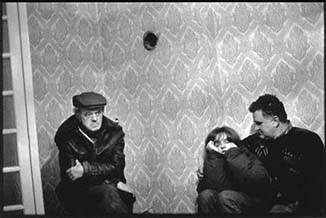|
|
|
 |
|
|
It is the last night before Vogosca goes to the Bosnians. As we walk into the house a tranquil activity buzzes around us. Men come in and out carrying sofas, vacuum cleaners, television sets, dolls; a home is being dismantled. The members of the family, if they are not helping, drift aimlessly and silently from room to room. The children lean against the walls of their room, their hands spread feeling the torn wallpaper, looking for a last time at the toys from an earlier childhood that will be left behind. Women, mothers and grandmothers, discreetly weep in short bursts in the corners; they are being ignored. A father consoles his daughter; his name is Zoran. He tells us a complicated tale of how he's already arranged that his home will go to an old Bosnian Muslim friend of his. We reconstruct the story of a meeting held outside Sarajevo, in Kiseljak, where the deal is said to have been made. A cheery face is put on. Kindness is mixed in the air with the soft passing of time. The last of the slivovitz is produced. The family and neighbors sit on a couch that will be left behind. The children light candles on the floor as a neighbor, Sanja, visits. She cracks jokes, lifts their spirits, while painting a dark picture of her future. The night seems to run on endlessly. But suddenly it is 5 o'clock in the morning, close to the deadline for the Bosnians to take over Vogosca. With a quick goodbye and a few tears the family packs into the van and leaves swiftly in the cold, snowy night, into the silence of the empty town. |
![]()